-
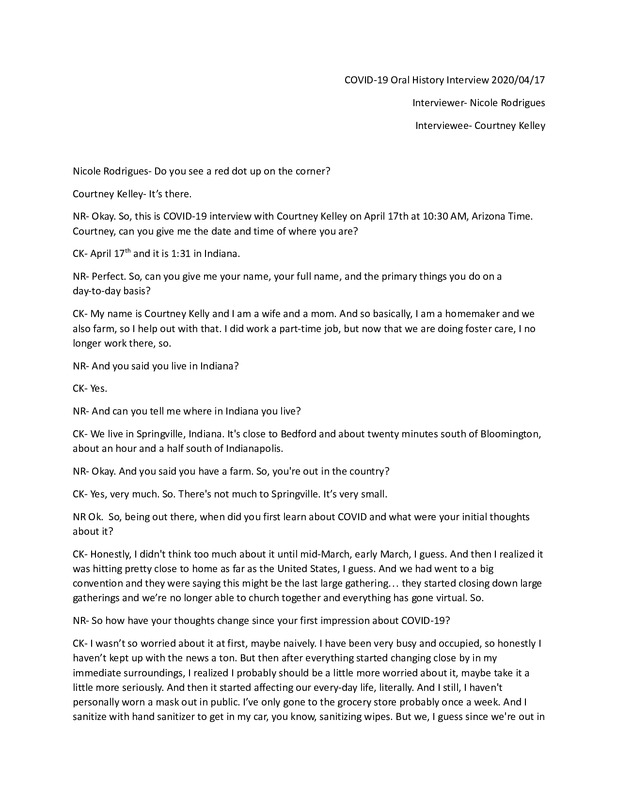
2020-04-17
-
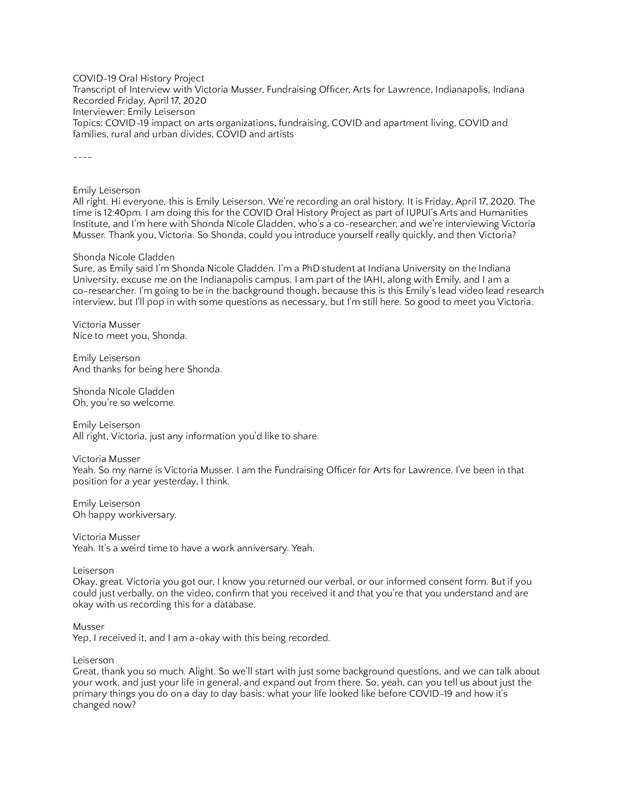
04/17/2020
-
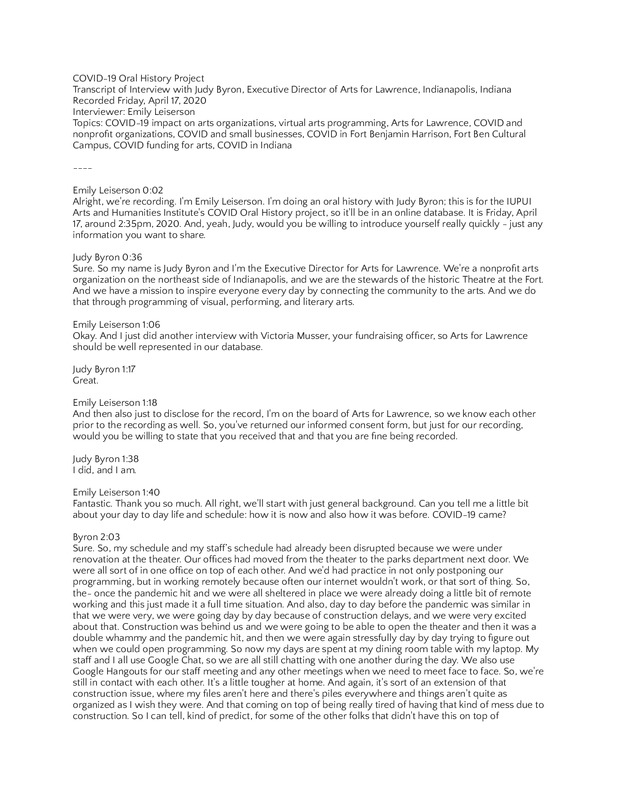
04/17/2020
-
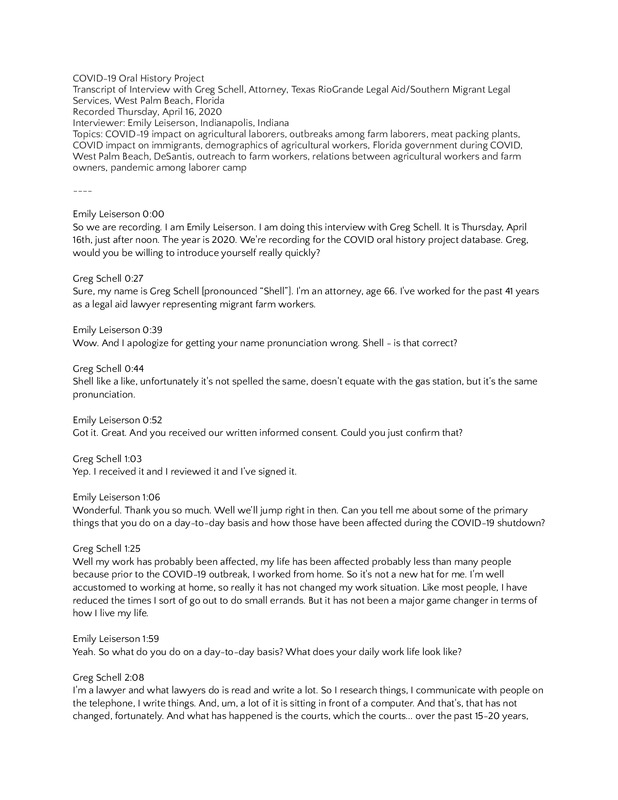
04/16/2020
-
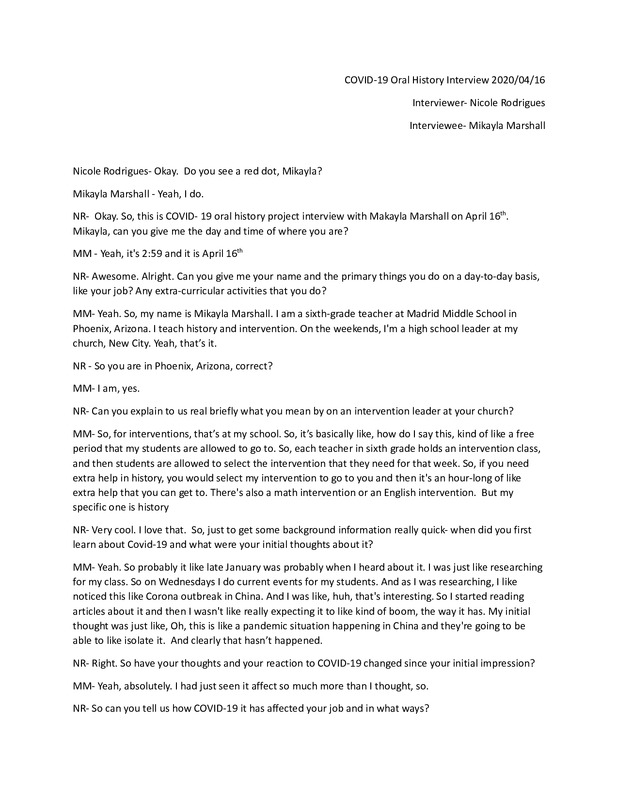
04/16/2020
-
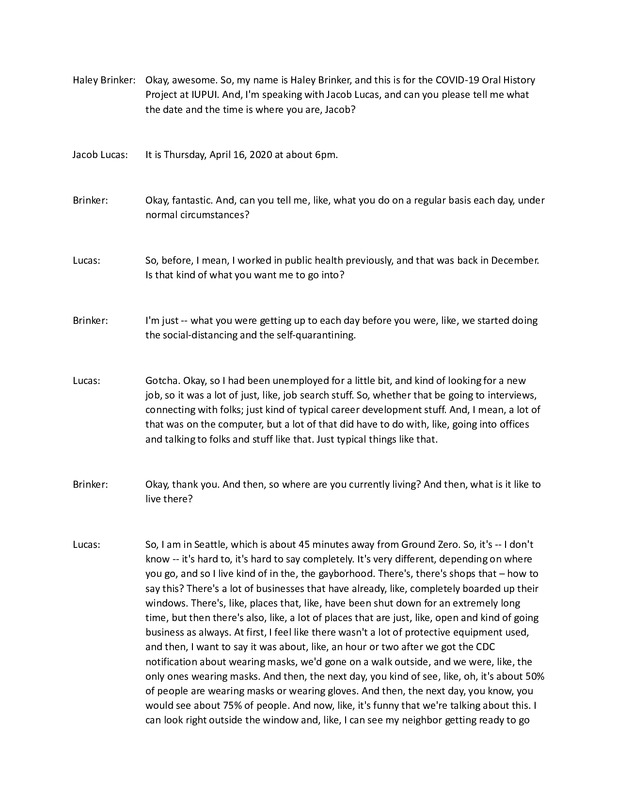
04/16/2020
-
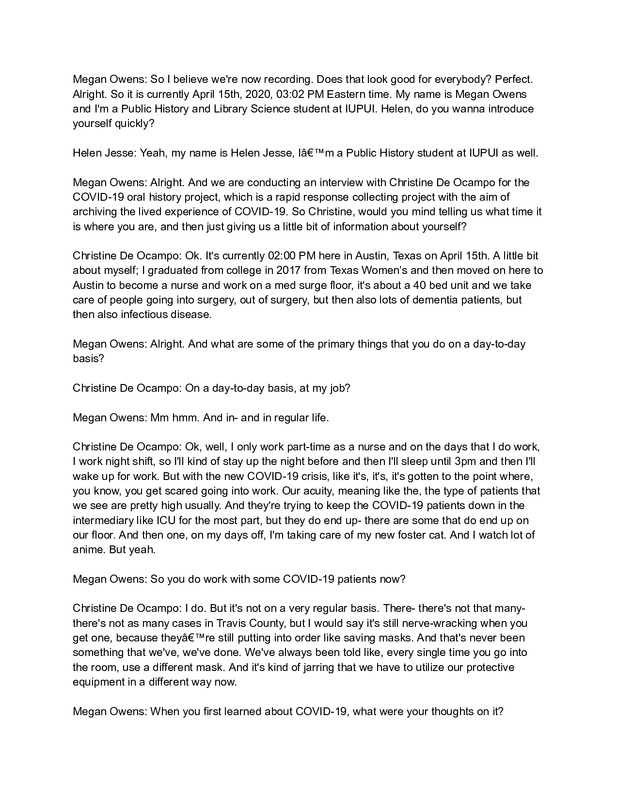
04/15/2020
-
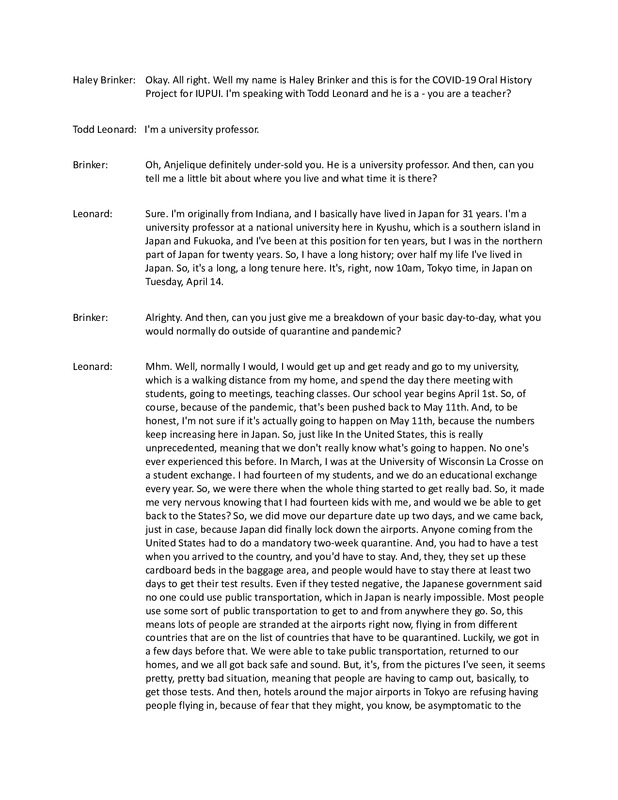
04/14/2020
-
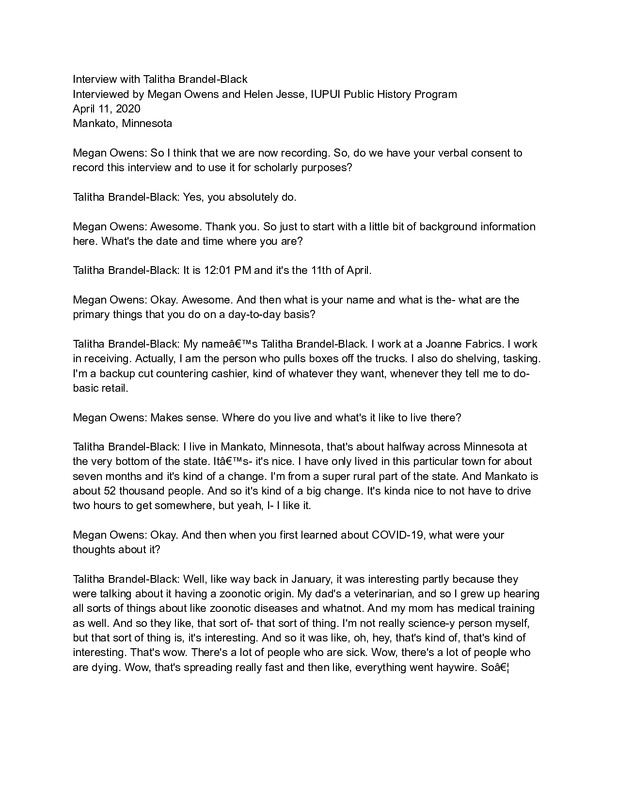
04/11/2020
-
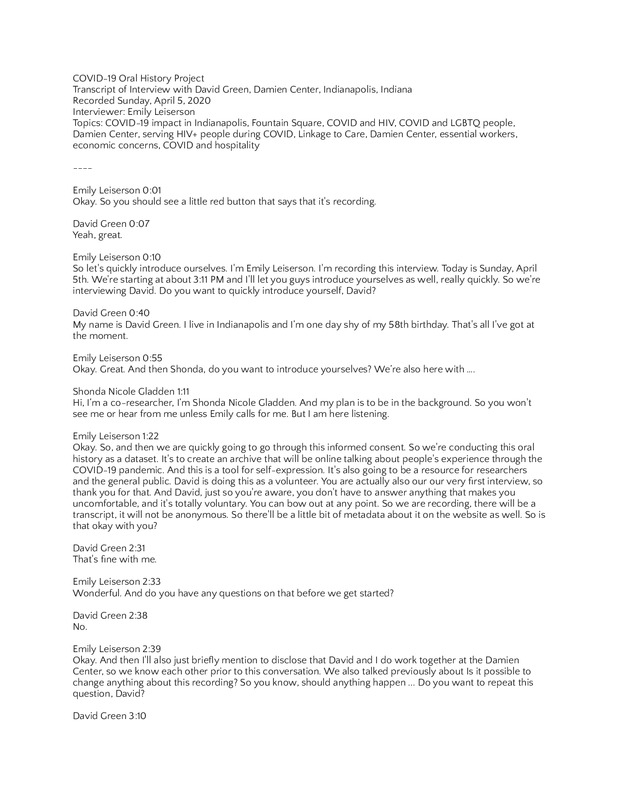
04/05/2020
-
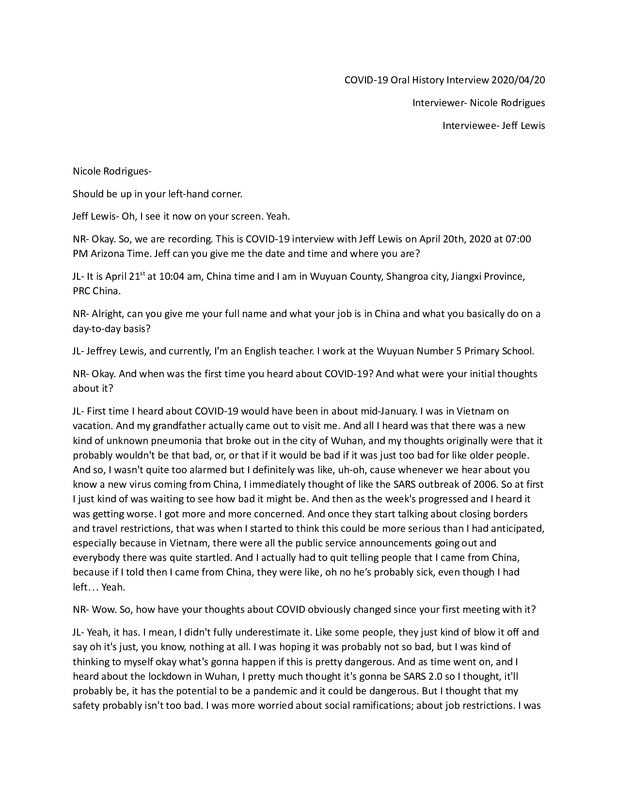
04/20/2020
-
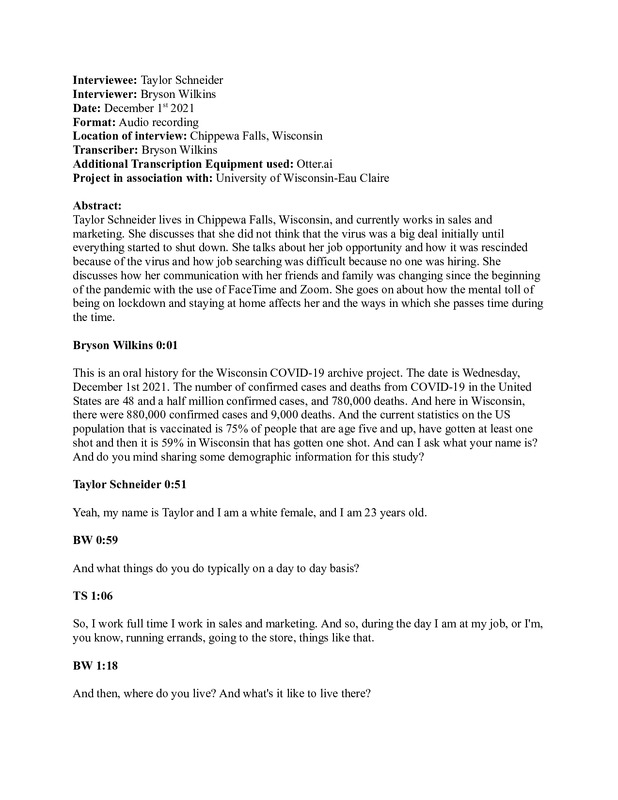
2021-12-01
Taylor Schneider lives in Chippewa Falls, Wisconsin, and currently works in sales and marketing. She discusses that she did not think that the virus was a big deal initially until everything started to shut down. She talks about her job opportunity and how it was rescinded because of the virus and how job searching was difficult because no one was hiring. She discusses how her communication with her friends and family was changing since the beginning of the pandemic with the use of FaceTime and Zoom. She goes on about how the mental toll of being on lockdown and staying at home affects her and the ways in which she passes time during the time.
-
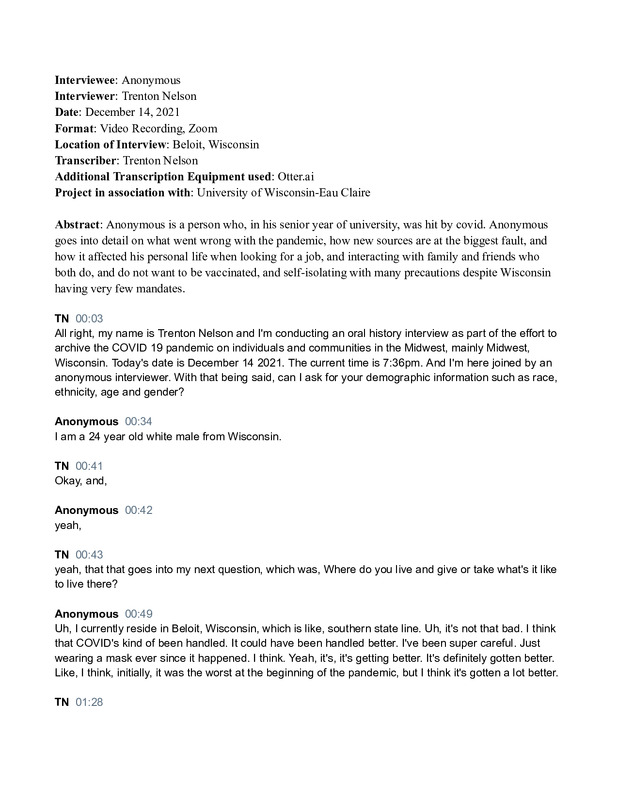
12/14/2021
Anonymous is a person who, in his senior year of university, was hit by covid. Anonymous goes into detail on what went wrong with the pandemic, how new sources are at the biggest fault, and how it affected his personal life when looking for a job, and interacting with family and friends who both do, and do not want to be vaccinated, and self-isolating with many precautions despite Wisconsin having very few mandates.
-
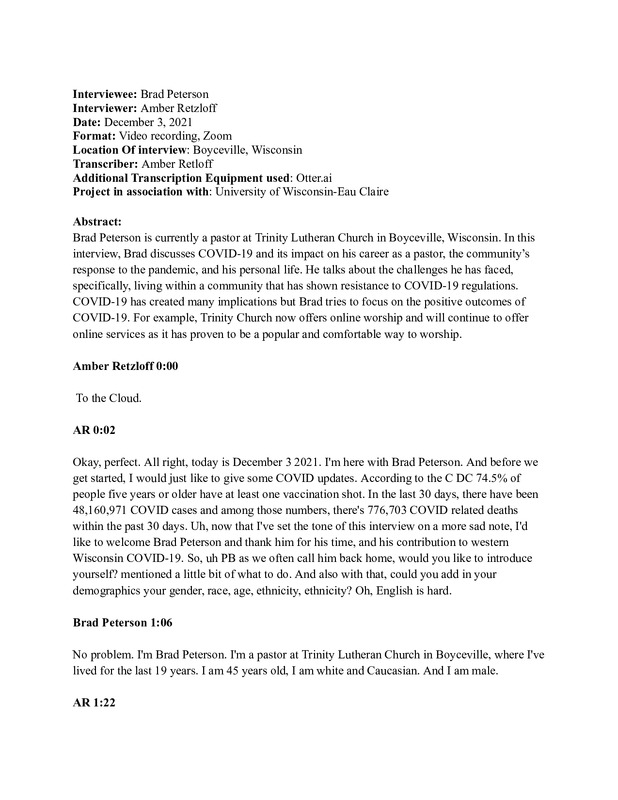
12/03/2021
Brad Peterson is currently a pastor at Trinity Lutheran Church in Boyceville, Wisconsin. In this interview, Brad discusses COVID-19 and its impact on his career as a pastor, the community’s response to the pandemic, and his personal life. He talks about the challenges he has faced, specifically, living within a community that has shown resistance to COVID-19 regulations. COVID-19 has created many implications but Brad tries to focus on the positive outcomes of COVID-19. For example, Trinity Church now offers online worship and will continue to offer online services as it has proven to be a popular and comfortable way to worship.
-
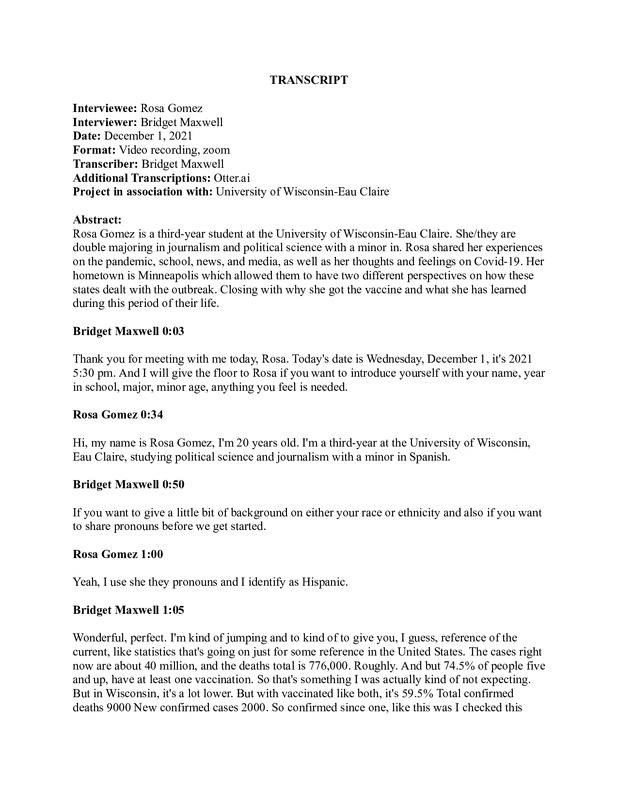
12/01/2021
Rosa Gomez is a third-year student at the University of Wisconsin-Eau Claire. She/they are double majoring in journalism and political science with a minor in. Rosa shared her experiences on the pandemic, school, news, and media, as well as her thoughts and feelings on Covid-19. Her hometown is Minneapolis which allowed them to have two different perspectives on how these states dealt with the outbreak. Closing with why she got the vaccine and what she has learned during this period of their life.
-
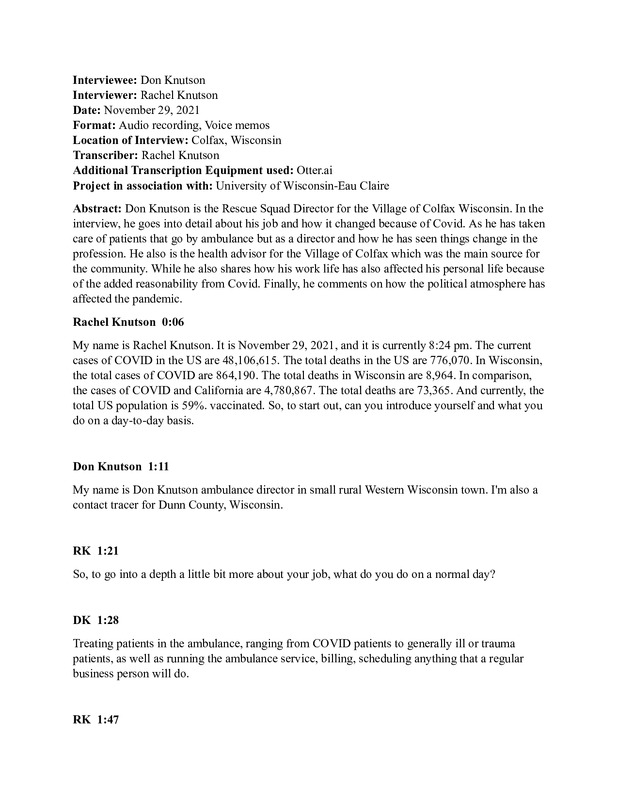
11/29/2021
Don Knutson is the Rescue Squad Director for the Village of Colfax Wisconsin. In the interview, he goes into detail about his job and how it changed because of Covid. As he has taken care of patients that go by ambulance but as a director and how he has seen things change in the profession. He also is the health advisor for the Village of Colfax which was the main source for the community. While he also shares how his work life has also affected his personal life because of the added reasonability from Covid. Finally, he comments on how the political atmosphere has affected the pandemic.
-
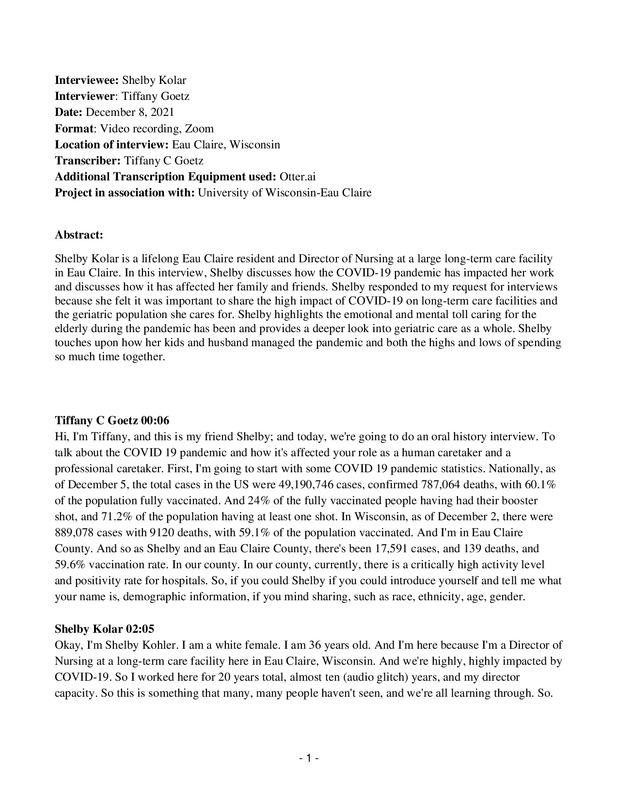
12/08/2021
Shelby Kolar is a lifelong Eau Claire resident and Director of Nursing at a large long-term care facility in Eau Claire. In this interview, Shelby discusses how the COVID-19 pandemic has impacted her work and discusses how it has affected her family and friends. Shelby responded to my interview request because she felt it was important to share the high impact of COVID-19 on long-term care facilities and
the geriatric population she cares for. Shelby highlights the emotional and mental toll of caring for the elderly during the pandemic and provides a deeper look into senior care as a whole. Shelby touches upon how her kids and husband managed the pandemic and the highs and lows of spending so much time together.
-
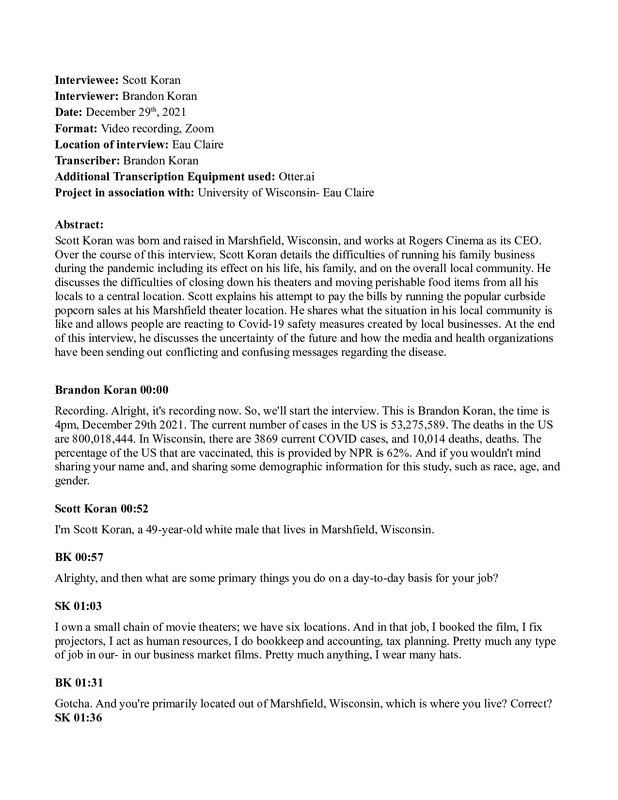
12/29/2021
Scott Koran was born and raised in Marshfield, Wisconsin, and works at Rogers Cinema as its CEO. Over the course of this interview, Scott Koran details the difficulties of running his family business during the pandemic including its effect on his life, his family, and on the overall local community. He discusses the difficulties of closing down his theaters and moving perishable food items from all his locals to a central location. Scott explains his attempt to pay the bills by running the popular curbside popcorn sales at his Marshfield theater location. He shares what the situation in his local community is like and allows people are reacting to Covid-19 safety measures created by local businesses. At the end of this interview, he discusses the uncertainty of the future and how the media and health organizations have been sending out conflicting and confusing messages regarding the disease.
-
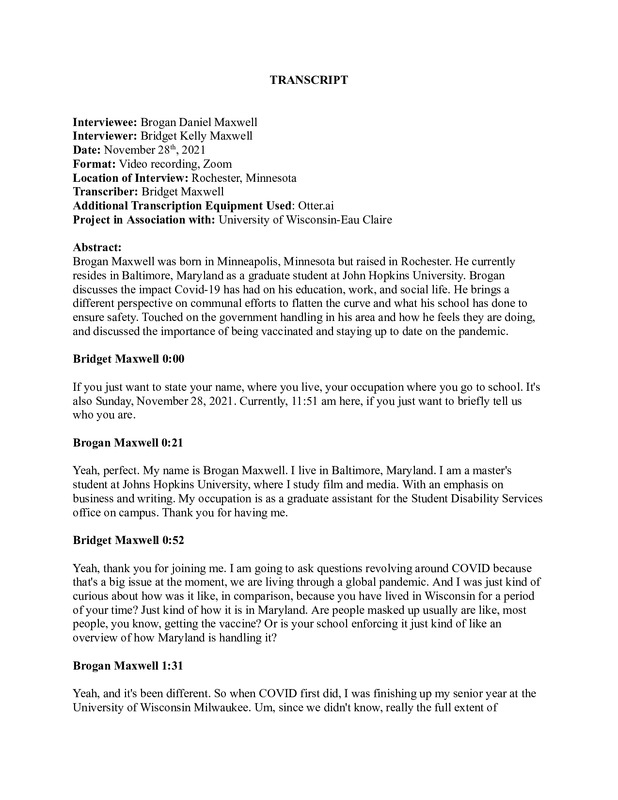
11/28/2021
Brogan Maxwell was born in Minneapolis, Minnesota but raised in Rochester. He currently resides in Baltimore, Maryland as a graduate student at John Hopkins University. Brogan discusses the impact Covid-19 has had on his education, work, and social life. He brings a different perspective on communal efforts to flatten the curve and what his school has done to ensure safety. Touched on the government handling in his area and how he feels they are doing, and discussed the importance of being vaccinated and staying up to date on the pandemic.
-
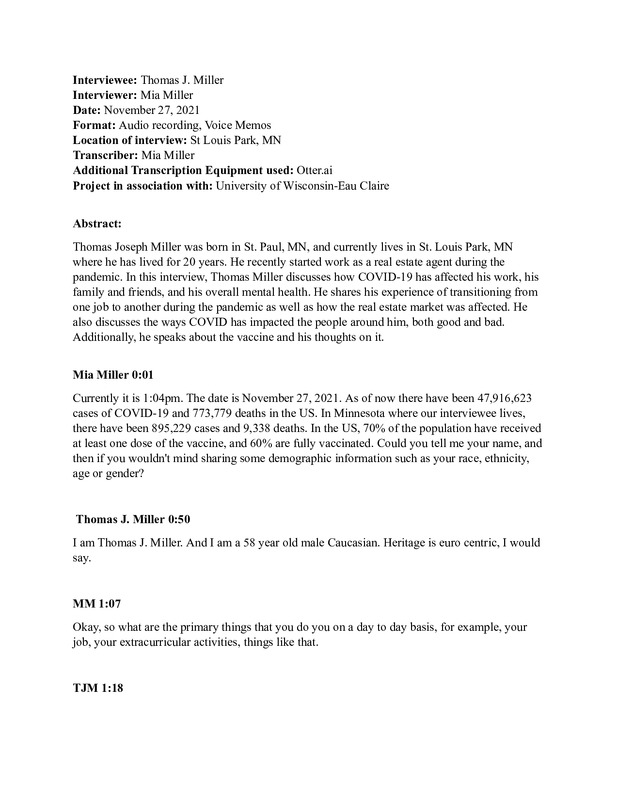
11/27/2021
Thomas Joseph Miller was born in St. Paul, MN, and currently lives in St. Louis Park, MN where he has lived for 20 years. He recently started work as a real estate agent during the pandemic. In this interview, Thomas Miller discusses how COVID-19 has affected his work, his family and friends, and his overall mental health. He shares his experience of transitioning from one job to another during the pandemic as well as how the real estate market was affected. He also discusses the ways COVID has impacted the people around him, both good and bad. Additionally, he speaks about the vaccine and his thoughts on it.
-
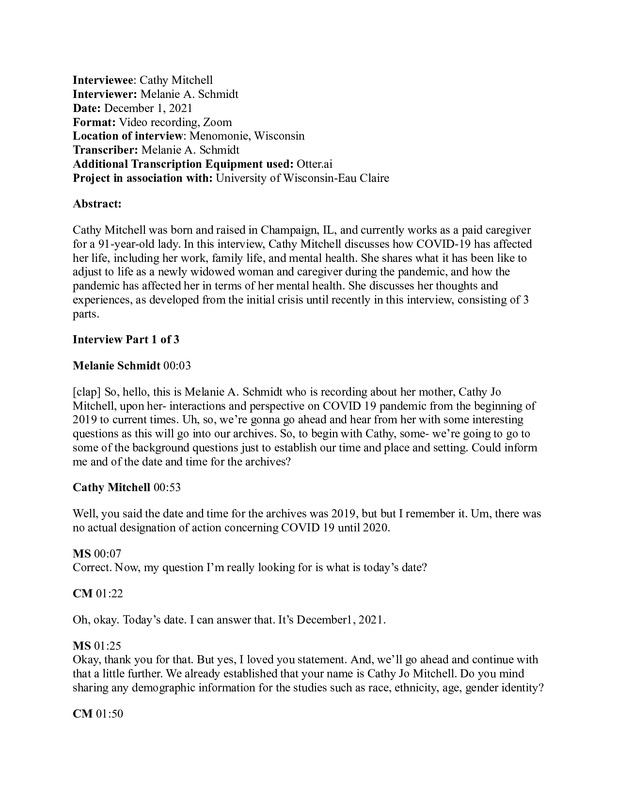
12/01/2021
Cathy Mitchell was born and raised in Champaign, IL, and currently works as a paid caregiver for a 91-year-old lady. In this interview, Cathy Mitchell discusses how COVID-19 has affected her life, including her work, family life, and mental health. She shares what it has been like to adjust to life as a newly widowed woman and caregiver during the pandemic, and how the pandemic has affected her in terms of her mental health. She discusses her thoughts and experiences, as developed from the initial crisis until recently in this interview, consisting of 3 parts.
-
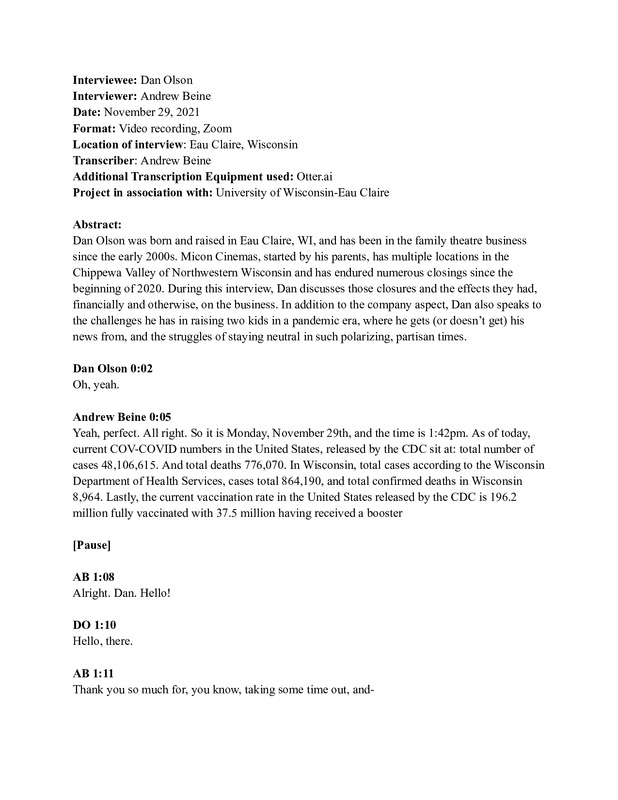
11/29/2021
Dan Olson was born and raised in Eau Claire, WI, and has been in the family theatre business since the early 2000s. Micon Cinemas, started by his parents, has multiple locations in the Chippewa Valley of Northwestern Wisconsin and has endured numerous closings since the beginning of 2020. During this interview, Dan discusses those closures and the effects they had, financially and otherwise, on the business. In addition to the company aspect, Dan also speaks to the challenges he has in raising two kids in a pandemic era, where he gets (or doesn’t get) his news from, and the struggles of staying neutral in such polarizing, partisan times.
-
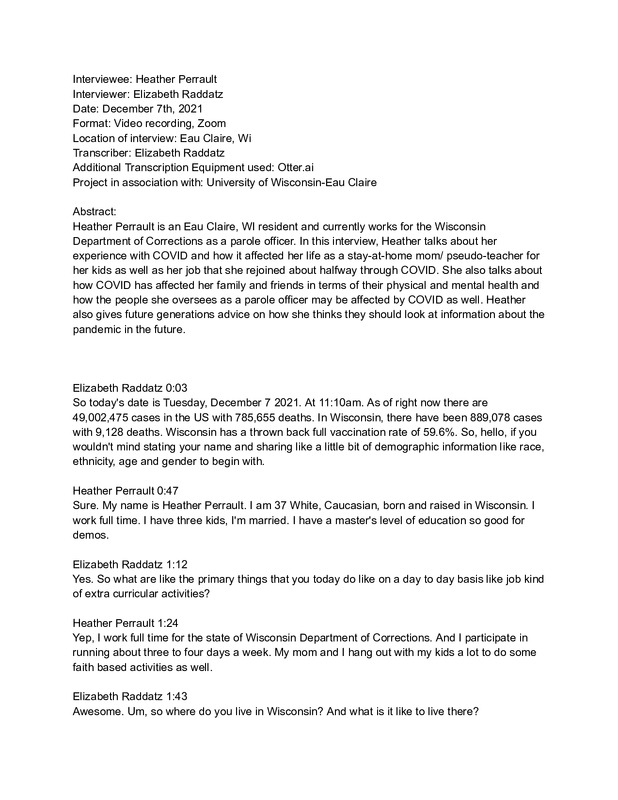
12/07/2021
Heather Perrault is an Eau Claire, WI resident and currently works for the Wisconsin Department of Corrections as a parole officer. In this interview, Heather talks about her experience with COVID and how it affected her life as a stay-at-home mom/ pseudo-teacher for her kids as well as her job that she rejoined about halfway through COVID. She also talks about how COVID has affected her family and friends in terms of their physical and mental health and how the people she oversees as a parole officer may be affected by COVID as well. Heather also gives future generations advice on how she thinks they should look at information about the pandemic in the future.
-
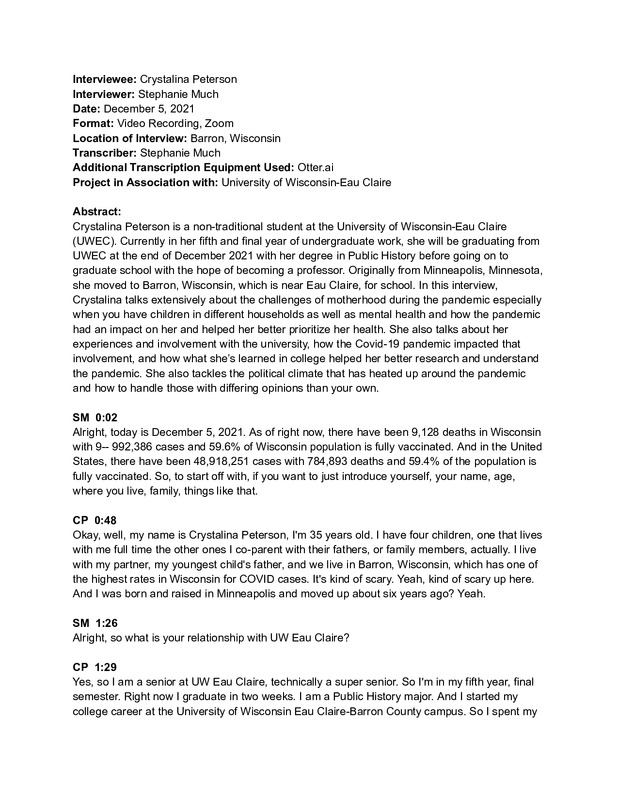
12/05/2021
Crystalina Peterson is a non-traditional University of Wisconsin-Eau Claire (UWEC) student. Currently, in her fifth and final year of undergraduate work, she will graduate from UWEC at the end of December 2021 with her degree in Public History before going on to graduate school with the hope of becoming a professor. Originally from Minneapolis, Minnesota, she moved to Barron, Wisconsin, near Eau Claire, for school. In this interview, Crystalina talks extensively about the challenges of motherhood during the pandemic especially when you have children in different households as well as mental health and how the pandemic had an impact on her and helped her better prioritize her health. She also talks about her experiences and involvement with the university, how the Covid-19 pandemic impacted that involvement, and how what she’s learned in college helped her better research and understand the pandemic. She also tackles the political climate that has heated up around the pandemic and how to handle those with differing opinions than your own.
-
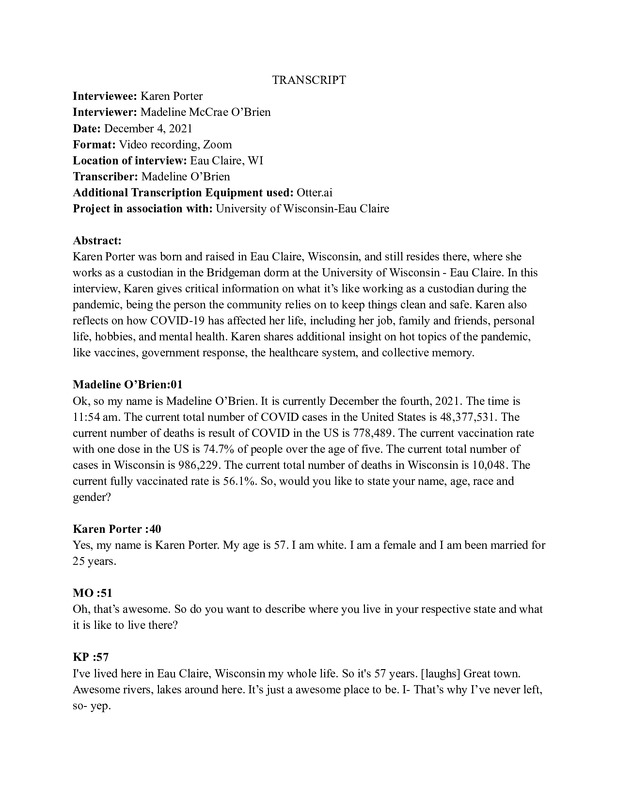
12/04/2021
Karen Porter was born and raised in Eau Claire, Wisconsin, and still resides there, where she works as a custodian in the Bridgeman dorm at the University of Wisconsin - Eau Claire. In this interview, Karen gives critical information on what it’s like working as a custodian during the pandemic, being the person the community relies on to keep things clean and safe. Karen also reflects on how COVID-19 has affected her life, including her job, family and friends, personal life, hobbies, and mental health. Karen shares additional insight on hot topics of the pandemic, like vaccines, government response, the healthcare system, and collective memory.
-
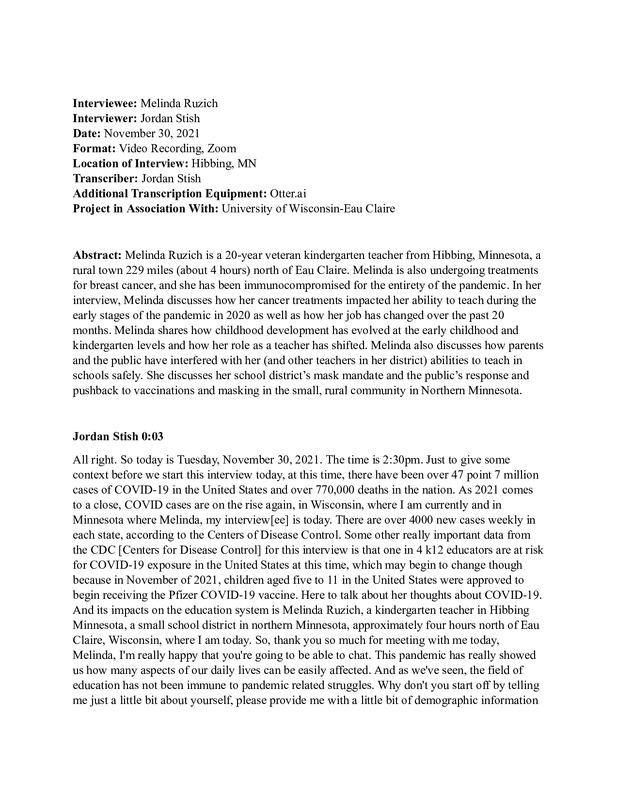
11/30/2021
Melinda Ruzich is a 20-year veteran kindergarten teacher from Hibbing, Minnesota, a rural town 229 miles (about 4 hours) north of Eau Claire. Melinda is also undergoing treatments for breast cancer, and she has been immunocompromised for the entirety of the pandemic. In her interview, Melinda discusses how her cancer treatments impacted her ability to teach during the early stages of the pandemic in 2020 as well as how her job has changed over the past 20 months. Melinda shares how childhood development has evolved at the early childhood and kindergarten levels and how her role as a teacher has shifted. Melinda also discusses how parents and the public have interfered with her (and other teachers in her district) abilities to teach in schools safely. She discusses her school district’s mask mandate and the public’s response and pushback to vaccinations and masking in the small, rural community in Northern Minnesota.
-
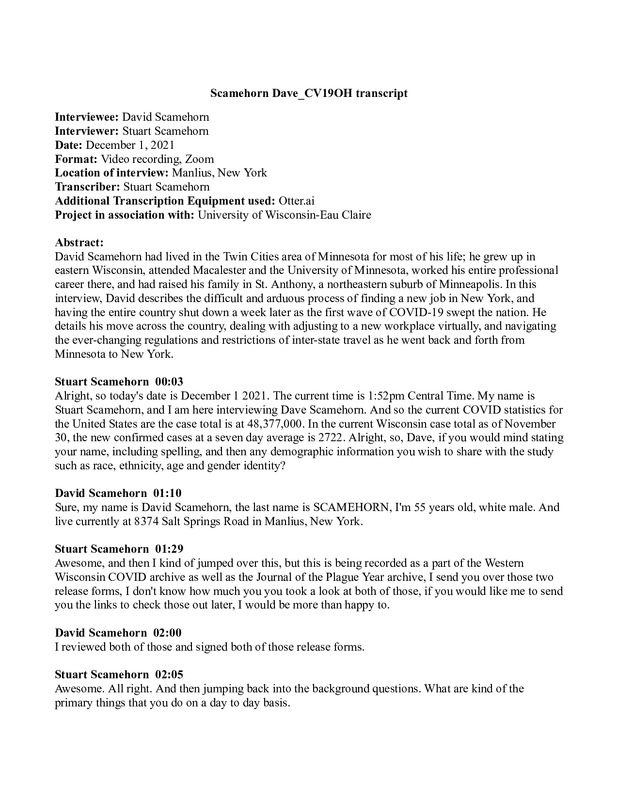
12/01/2021
David Scamehorn had lived in the Twin Cities area of Minnesota for most of his life; he grew up in eastern Wisconsin, attended Macalester and the University of Minnesota, worked his entire professional career there, and had raised his family in St. Anthony, a northeastern suburb of Minneapolis. In this interview, David describes the difficult and arduous process of finding a new job in New York, and having the entire country shut down a week later as the first wave of COVID-19 swept the nation. He details his move across the country, dealing with adjusting to a new workplace virtually, and navigating the ever-changing regulations and restrictions of inter-state travel as he went back and forth from Minnesota to New York.
-
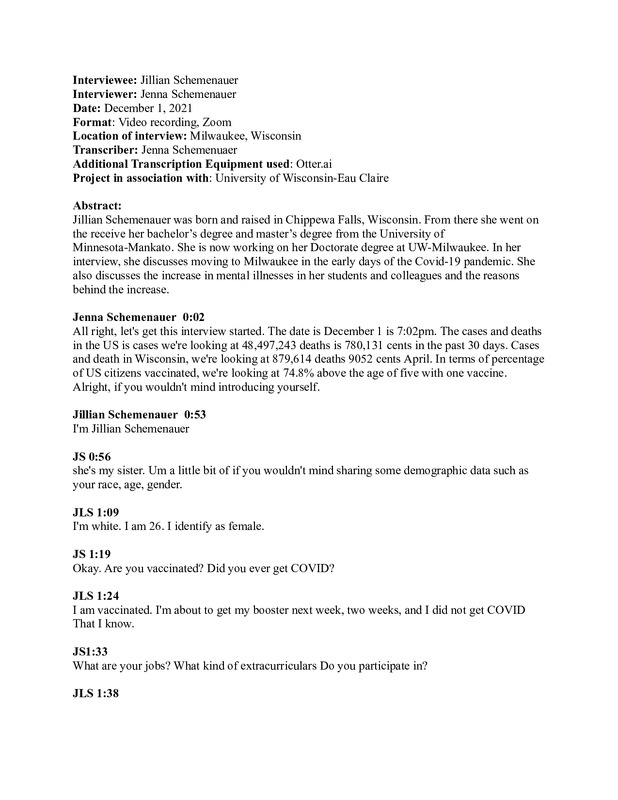
12/01/2021
Jillian Schemenauer was born and raised in Chippewa Falls, Wisconsin. From there she went on the receive her bachelor’s degree and master’s degree from the University of Minnesota-Mankato. She is now working on her Doctorate degree at UW-Milwaukee. In her interview, she discusses moving to Milwaukee in the early days of the Covid-19 pandemic. She also discusses the increase in mental illnesses in her students and colleagues and the reasons behind the increase.
-
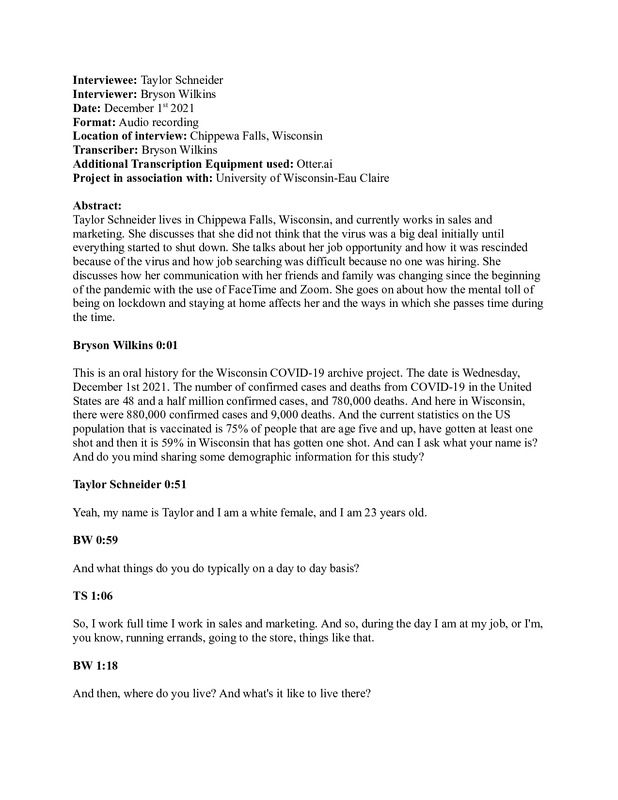
12/01/2021
Taylor Schneider lives in Chippewa Falls, Wisconsin, and currently works in sales and marketing. She discusses that she did not think that the virus was a big deal initially until everything started to shut down. She talks about her job opportunity and how it was rescinded because of the virus and how job searching was difficult because no one was hiring. She discusses how her communication with her friends and family was changing since the beginning of the pandemic with the use of FaceTime and Zoom. She goes on about how the mental toll of being on lockdown and staying at home affects her and the ways in which she passes time during the time.
-
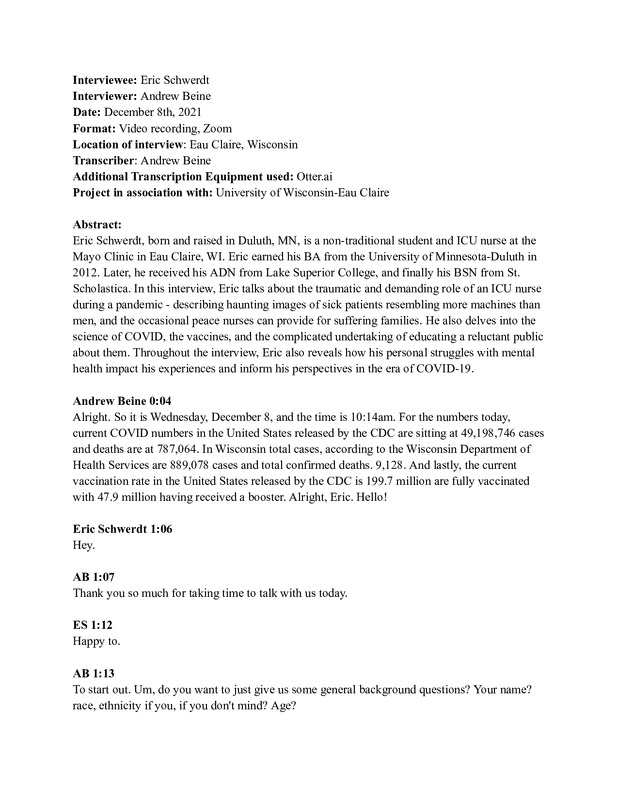
12/08/2021
Eric Schwerdt, born and raised in Duluth, MN, is a non-traditional student and ICU nurse at the Mayo Clinic in Eau Claire, WI. Eric earned his BA from the University of Minnesota-Duluth in 2012. Later, he received his ADN from Lake Superior College, and finally his BSN from St. Scholastica. In this interview, Eric talks about the traumatic and demanding role of an ICU nurse during a pandemic - describing haunting images of sick patients resembling more machines than men, and the occasional peace nurses can provide for suffering families. He also delves into the science of COVID, the vaccines, and the complicated undertaking of educating a reluctant public about them. Throughout the interview, Eric also reveals how his personal struggles with mental health impact his experiences and inform his perspectives in the era of COVID-19.
-
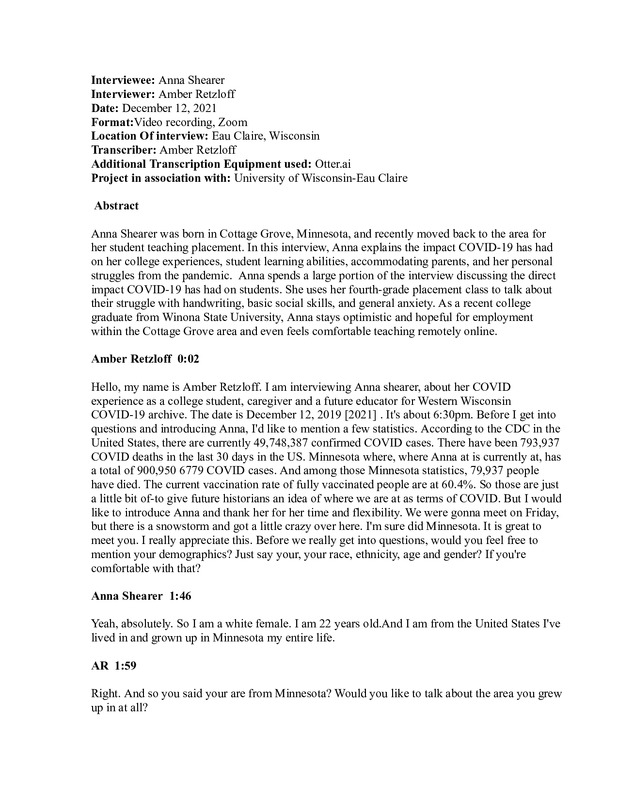
12/12/2021
Anna Shearer was born in Cottage Grove, Minnesota, and recently moved back to the area for her student teaching placement. In this interview, Anna explains the impact COVID-19 has had on her college experiences, student learning abilities, accommodating parents, and her personal struggles from the pandemic. Anna spends a large portion of the interview discussing the direct impact COVID-19 has had on students. She uses her fourth-grade placement class to talk about their struggle with handwriting, basic social skills, and general anxiety. As a recent college graduate from Winona State University, Anna stays optimistic and hopeful for employment within the Cottage Grove area and even feels comfortable teaching remotely online.
-
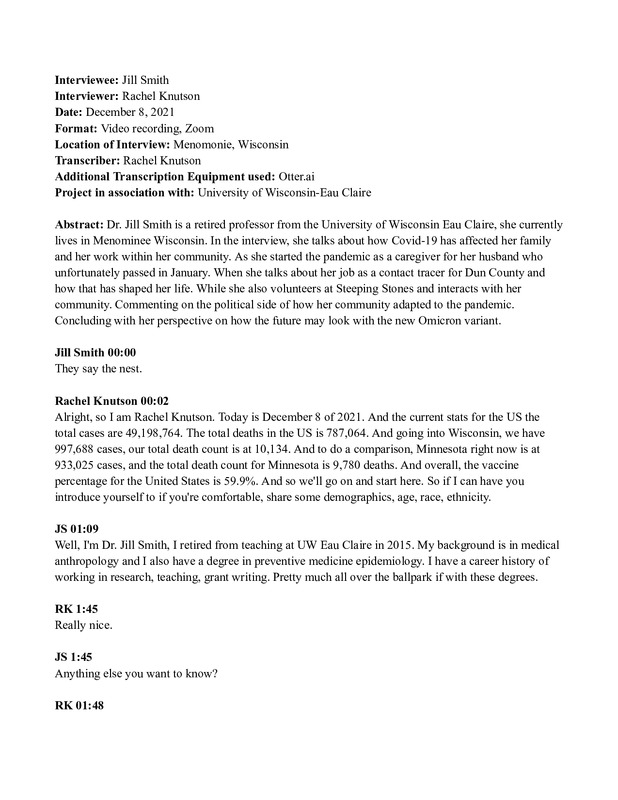
12/08/2021
Dr. Jill Smith is a retired professor from the University of Wisconsin Eau Claire, she currently lives in Menominee Wisconsin. In the interview, she talks about how Covid-19 has affected her family and her work within her community. As she started the pandemic as a caregiver for her husband who unfortunately passed in January. When she talks about her job as a contact tracer for Dun County and how that has shaped her life. While she also volunteers at Steeping Stones and interacts with her community. Commenting on the political side of how her community adapted to the pandemic. Concluding with her perspective on how the future may look with the new Omicron variant.
-
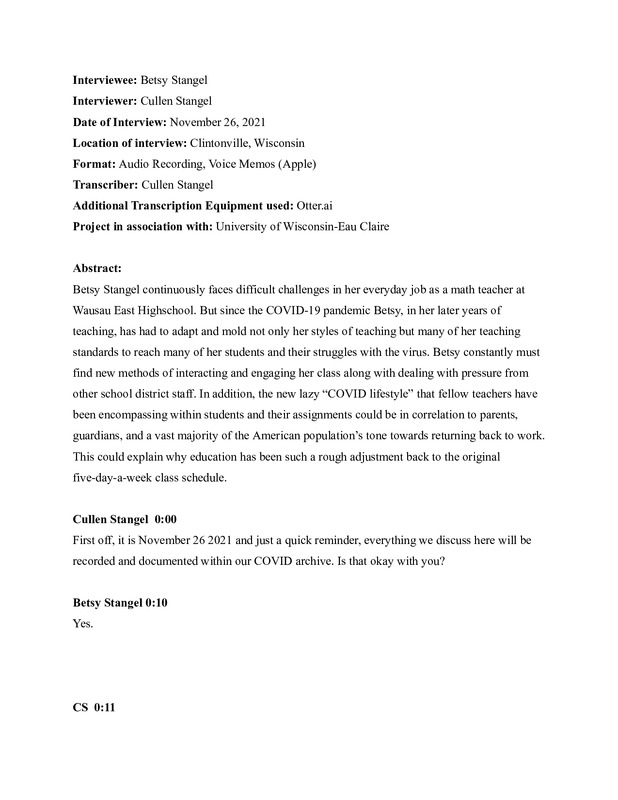
11/26/2021
Betsy Stangel continuously faces difficult challenges in her everyday job as a math teacher at Wausau East Highschool. But since the COVID-19 pandemic Betsy, in her later years of teaching, has had to adapt and mold not only her styles of teaching but many of her teaching standards to reach many of her students and their struggles with the virus. Betsy constantly must find new methods of interacting and engaging her class along with dealing with pressure from other school district staff. In addition, the new lazy “COVID lifestyle” that fellow teachers have been encompassing within students and their assignments could be in correlation to parents, guardians, and a vast majority of the American population’s tone towards returning back to work. This could explain why education has been such a rough adjustment back to the original five-day-a-week class schedule.
-
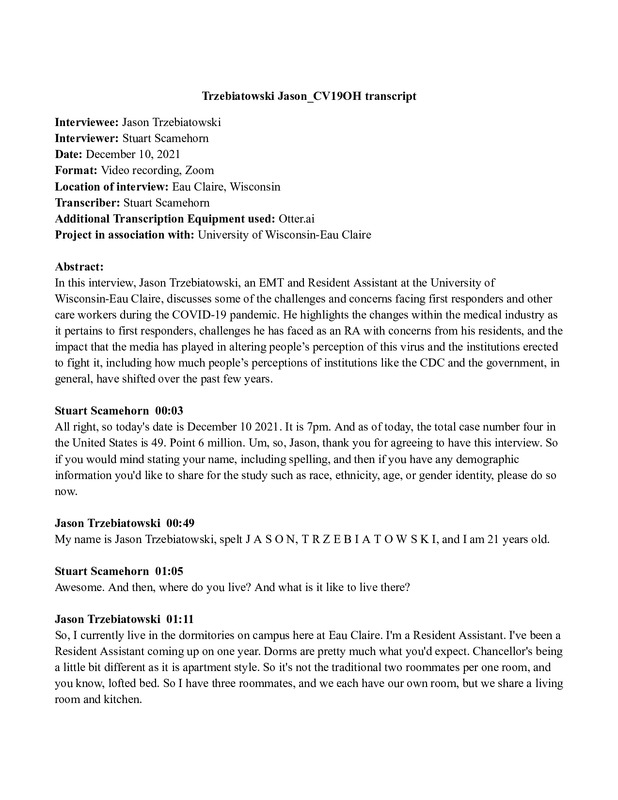
12/10/2021
In this interview, Jason Trzebiatowski, an EMT and Resident Assistant at the University of Wisconsin-Eau Claire, discusses some of the challenges and concerns facing first responders and other care workers during the COVID-19 pandemic. He highlights the changes within the medical industry as it pertains to first responders, challenges he has faced as an RA with concerns from his residents, and the impact that the media has played in altering people’s perception of this virus and the institutions erected to fight it, including how much people’s perceptions of institutions like the CDC and the government, in general, have shifted over the past few years.
-
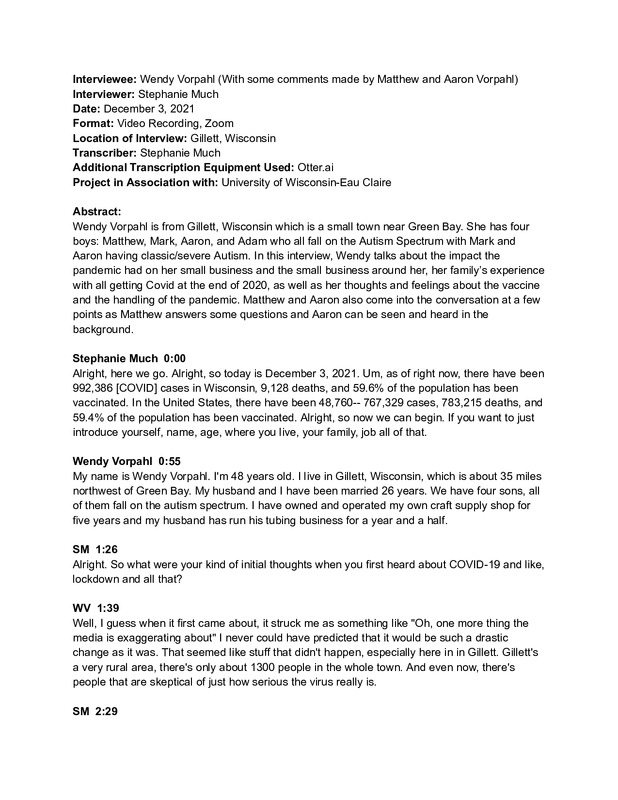
12/03/2021
Wendy Vorpahl is from Gillett, Wisconsin which is a small town near Green Bay. She has four boys: Matthew, Mark, Aaron, and Adam who all fall on the Autism Spectrum with Mark and Aaron having classic/severe Autism. In this interview, Wendy talks about the impact the pandemic had on her small business and the small business around her, her family’s experience with all getting Covid at the end of 2020, as well as her thoughts and feelings about the vaccine and the handling of the pandemic. Matthew and Aaron also come into the conversation at a few points as Matthew answers some questions and Aaron can be seen and heard in the background.
-
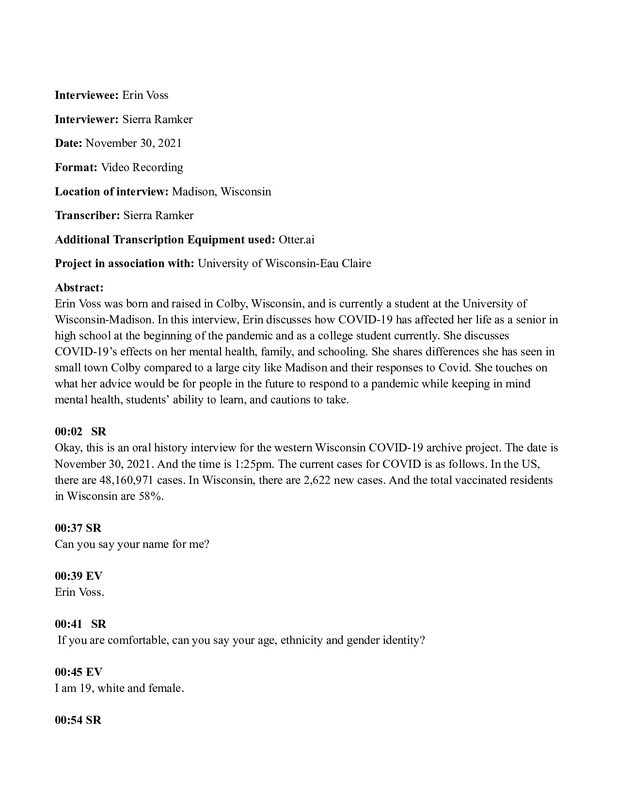
11/30/2021
Erin Voss was born and raised in Colby, Wisconsin, and is currently a student at the University of Wisconsin-Madison. In this interview, Erin discusses how COVID-19 has affected her life as a senior in high school at the beginning of the pandemic and as a college student currently. She discusses COVID-19’s effects on her mental health, family, and schooling. She shares differences she has seen in small town Colby compared to a large city like Madison and their responses to Covid. She touches on what her advice would be for people in the future to respond to a pandemic while keeping in mind mental health, students’ ability to learn, and cautions to take.
-
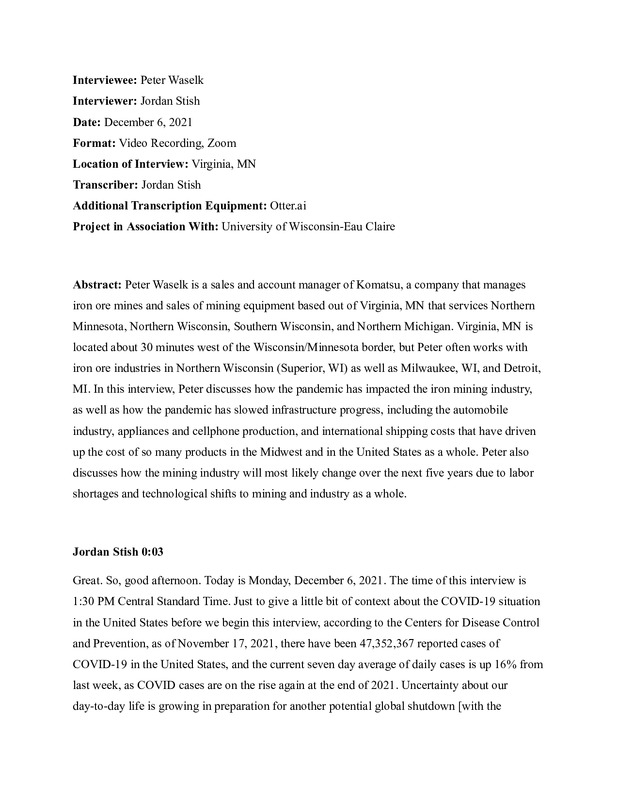
12/06/2021
Peter Waselk is a sales and account manager of Komatsu, a company that manages iron ore mines and sales of mining equipment based out of Virginia, MN that services Northern Minnesota, Northern Wisconsin, Southern Wisconsin, and Northern Michigan. Virginia, MN is located about 30 minutes west of the Wisconsin/Minnesota border. Still, Peter often works with iron ore industries in Northern Wisconsin (Superior, WI) as well as Milwaukee, WI, and Detroit, MI. In this interview, Peter discusses how the pandemic has impacted the iron mining industry, as well as how the pandemic has slowed infrastructure progress, including the automobile industry, appliances and cellphone production, and international shipping costs that have driven up the cost of so many products in the Midwest and the United States as a whole. Peter also discusses how the mining industry will most likely change over the next five years due to labor shortages and technological shifts to mining and industry as a whole.
-
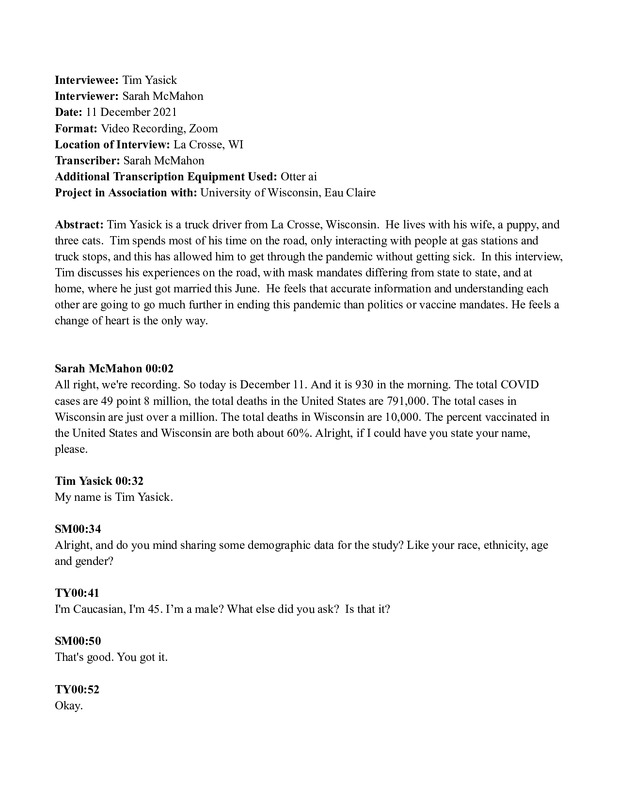
12/11/2021
Tim Yasick is a truck driver from La Crosse, Wisconsin. He lives with his wife, a puppy, and three cats. Tim spends most of his time on the road, only interacting with people at gas stations and truck stops, and this has allowed him to get through the pandemic without getting sick. In this interview, Tim discusses his experiences on the road, with mask mandates differing from state to state, and at home, where he just got married this June. He feels that accurate information and understanding each other are going to go much further in ending this pandemic than politics or vaccine mandates. He feels a change of heart is the only way.
-
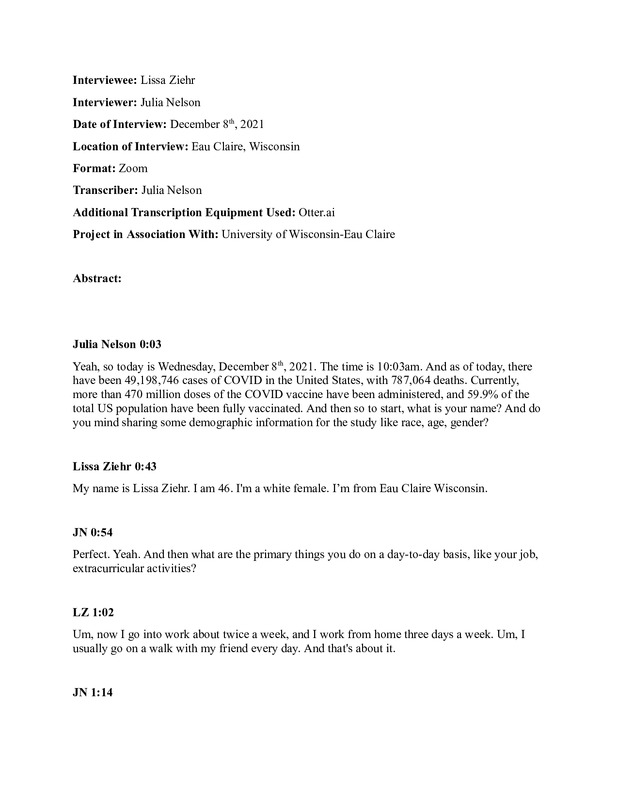
12/08/2021
-
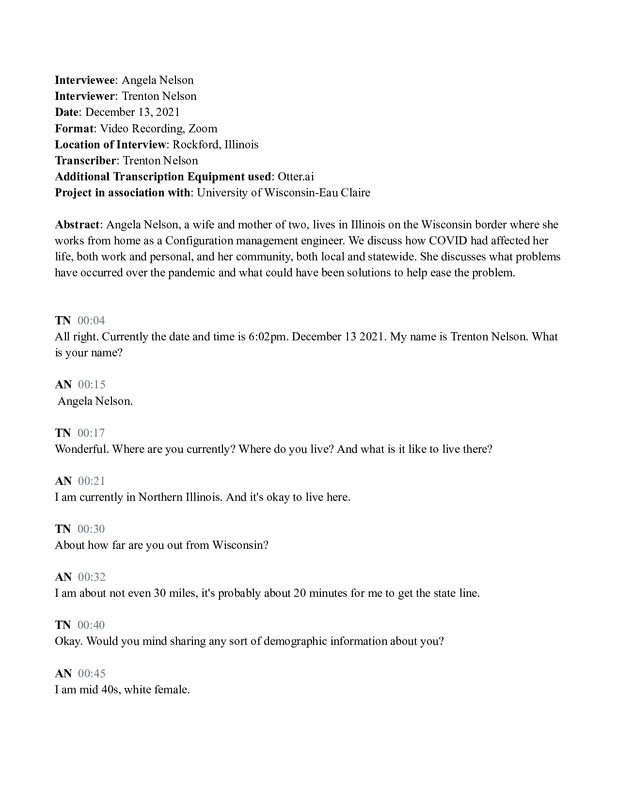
12/13/2021
Angela Nelson, a wife and mother of two, lives in Illinois on the Wisconsin border where she works from home as a Configuration management engineer. We discuss how COVID had affected her life, both work and personal, and her community, both local and statewide. She discusses what problems have occurred over the pandemic and what could have been solutions to help ease the problem.
-
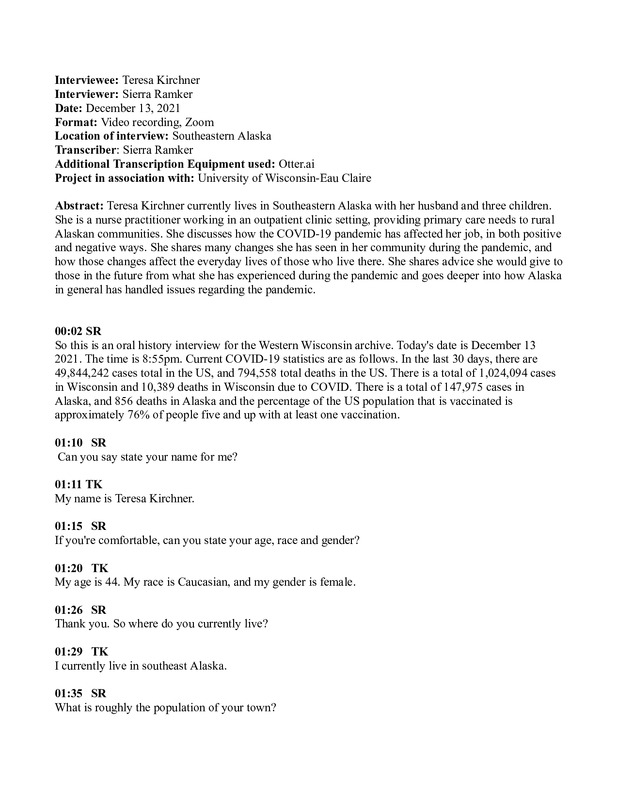
12/13/2021
Teresa Kirchner currently lives in Southeastern Alaska with her husband and three children. She is a nurse practitioner working in an outpatient clinic setting, providing primary care needs to rural Alaskan communities. She discusses how the COVID-19 pandemic has affected her job, in both positive and negative ways. She shares many changes she has seen in her community during the pandemic, and how those changes affect the everyday lives of those who live there. She shares advice she would give to those in the future from what she has experienced during the pandemic and goes deeper into how Alaska in general has handled issues regarding the pandemic.
-
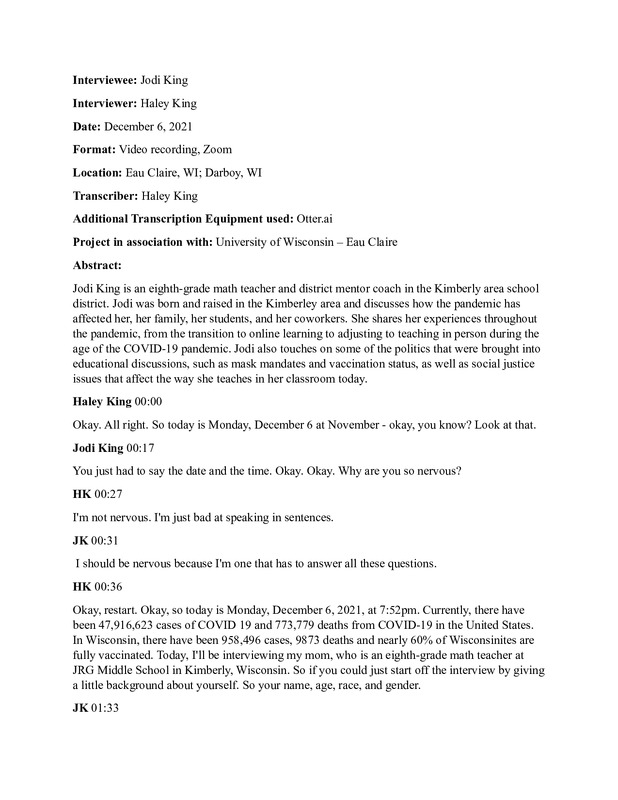
12/06/2021
Jodi King is an eighth-grade math teacher and district mentor coach in the Kimberly area school district. Jodi was born and raised in the Kimberly area and discusses how the pandemic has affected her, her family, her students, and her coworkers. She shares her experiences throughout the pandemic, from the transition to online learning to adjusting to teaching in person during the age of the COVID-19 pandemic. Jodi also touches on some of the politics that were brought into educational discussions, such as mask mandates and vaccination status, as well as social justice issues that affect the way she teaches in her classroom today.
-
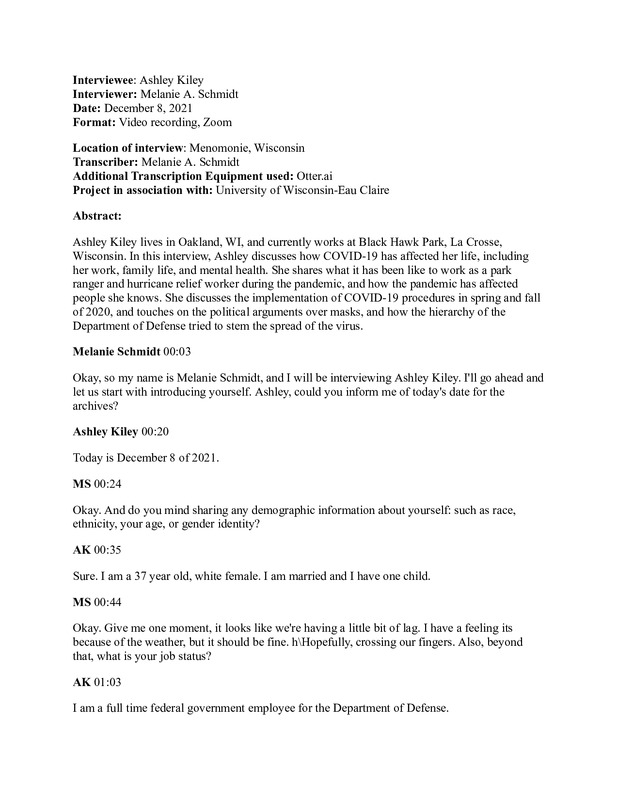
12/08/2021
Ashley Kiley lives in Oakland, WI, and currently works at Black Hawk Park, La Crosse, Wisconsin. In this interview, Ashley discusses how COVID-19 has affected her life, including her work, family life, and mental health. She shares what it has been like to work as a park ranger and hurricane relief worker during the pandemic, and how the pandemic has affected people she knows. She discusses the implementation of COVID-19 procedures in spring and fall of 2020, and touches on the political arguments over masks, and how the hierarchy of the Department of Defense tried to stem the spread of the virus.
-
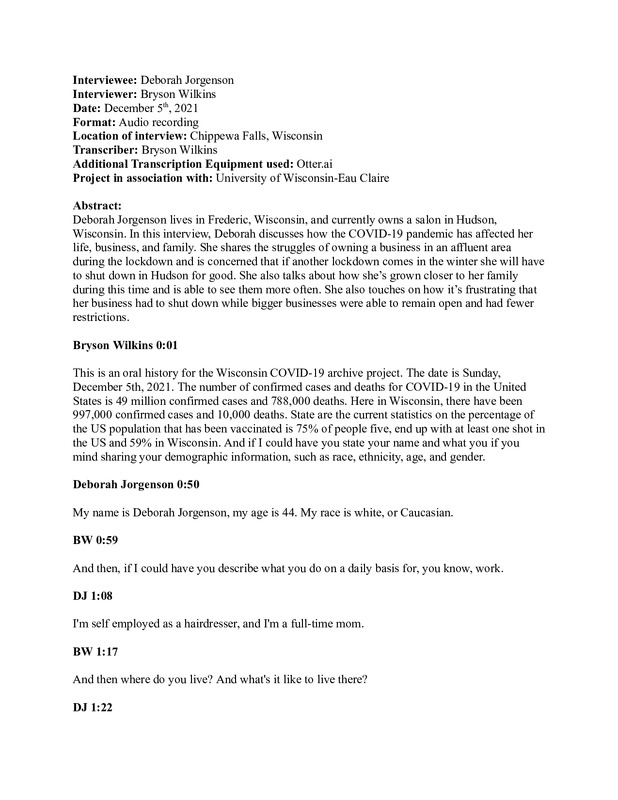
12/05/2021
Deborah Jorgenson lives in Frederic, Wisconsin, and currently owns a salon in Hudson, Wisconsin. In this interview, Deborah discusses how the COVID-19 pandemic has affected her life, business, and family. She shares the struggles of owning a business in an affluent area during the lockdown and is concerned that if another lockdown comes in the winter she will have to shut down in Hudson for good. She also talks about how she’s grown closer to her family during this time and is able to see them more often. She also touches on how it’s frustrating that her business had to shut down while bigger businesses were able to remain open and had fewer restrictions.
-
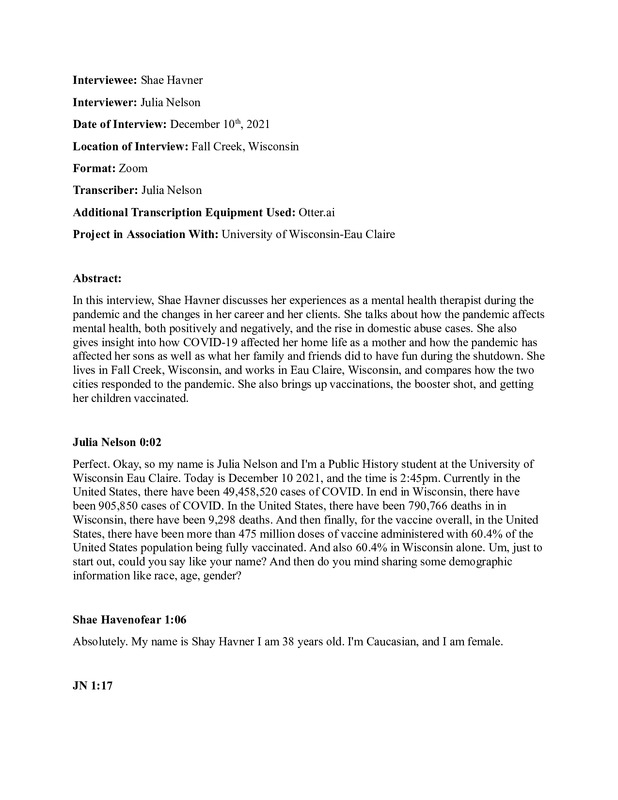
12/10/2021
In this interview, Shae Havner discusses her experiences as a mental health therapist during the pandemic and the changes in her career and her clients. She talks about how the pandemic affects mental health, both positively and negatively, and the rise in domestic abuse cases. She also gives insight into how COVID-19 affected her home life as a mother and how the pandemic has affected her sons as well as what her family and friends did to have fun during the shutdown. She lives in Fall Creek, Wisconsin, and works in Eau Claire, Wisconsin, and compares how the two cities responded to the pandemic. She also brings up vaccinations, the booster shot, and getting her children vaccinated.
-
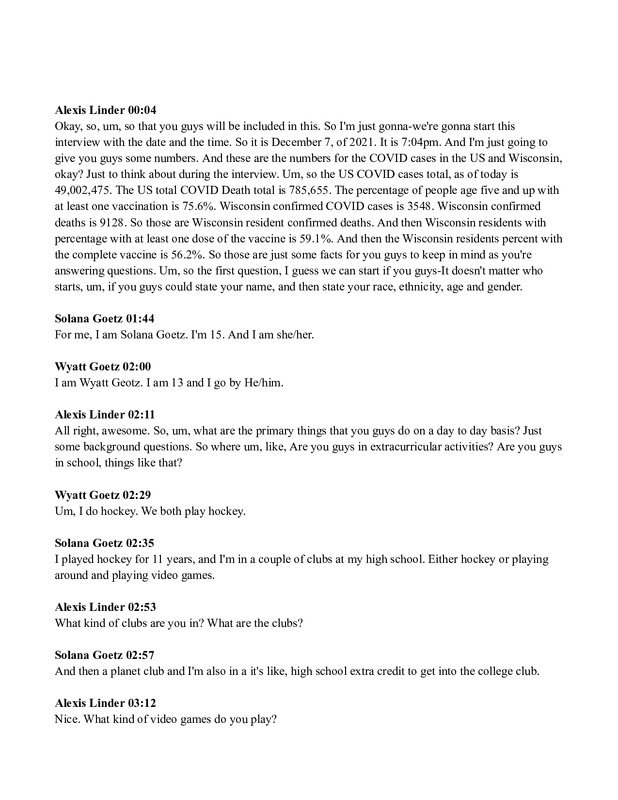
12/07/2021
-

11/27/2021
Rebecca Lynn Ferber is a resident of Oronoco, MN, and currently works for the Mayo Clinic in Rochester as a CRNA (Certified Registered Nurse Anesthetist). In this interview, Rebecca talks about how COVID has affected her job as a CRNA and Mayo Clinic as a whole as well as a mom and wife. She also talks about how it has affected her family and friends and how some of her relationships have been strained because of different views on COVID. She touches on how it not only affects people's physical health but mental health as well and gives some advice for future generations.
-
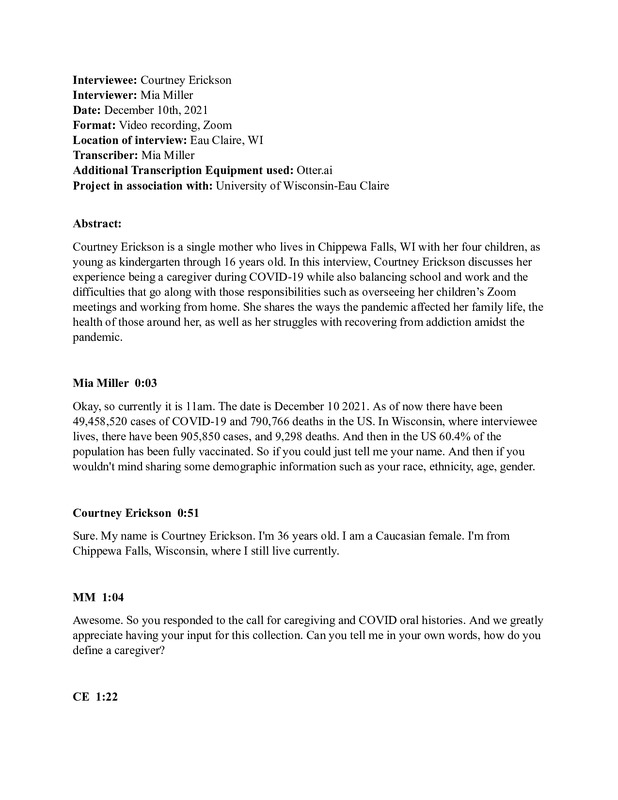
12/10/2021
Courtney Erickson is a single mother who lives in Chippewa Falls, WI with her four children, as young as kindergarten through 16 years old. In this interview, Courtney Erickson discusses her experience being a caregiver during COVID-19 while also balancing school and work and the difficulties that go along with those responsibilities such as overseeing her children’s Zoom meetings and working from home. She shares the ways the pandemic affected her family life, the health of those around her, as well as her struggles with recovering from addiction amidst the pandemic.
-
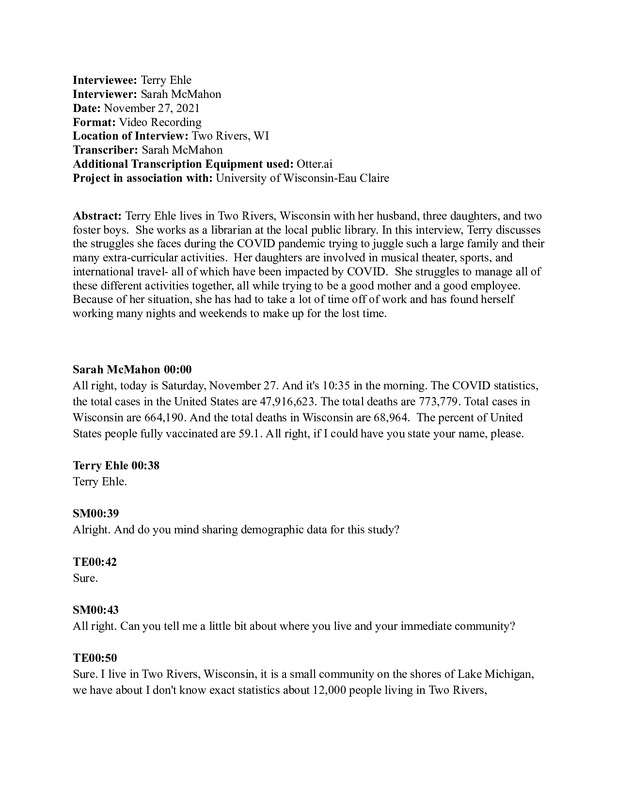
11/27/2021
Terry Ehle lives in Two Rivers, Wisconsin with her husband, three daughters, and two foster boys. She works as a librarian at the local public library. In this interview, Terry discusses the struggles she faces during the COVID pandemic trying to juggle such a large family and their many extra-curricular activities. Her daughters are involved in musical theater, sports, and international travel- all of which have been impacted by COVID. She struggles to manage all of these different activities together, all while trying to be a good mother and a good employee. Because of her situation, she has had to take a lot of time off of work and has found herself working many nights and weekends to make up for the lost time.
-
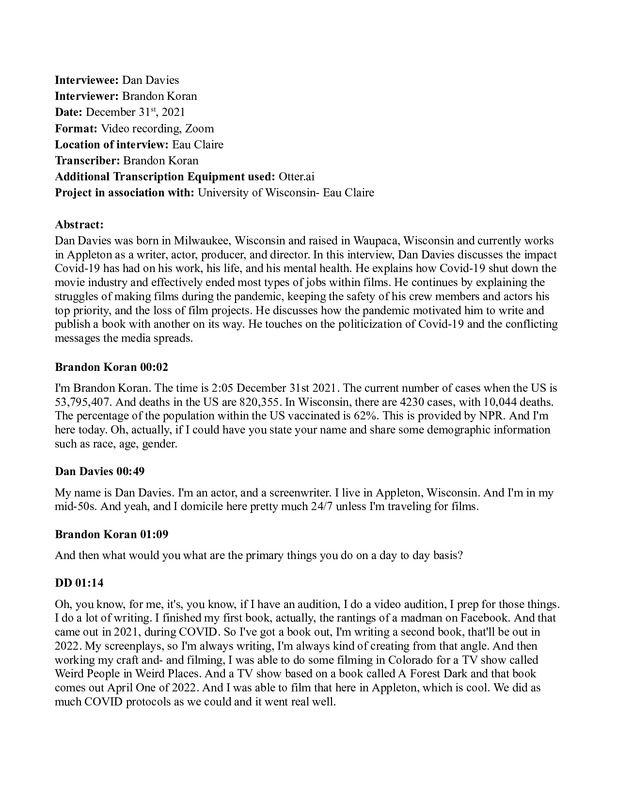
12/31/2021
Dan Davies was born in Milwaukee, Wisconsin, raised in Waupaca, Wisconsin, and works in Appleton as a writer, actor, producer, and director. In this interview, Dan Davies discusses the impact Covid-19 has had on his work, life, and mental health. He explains how Covid-19 shut down the movie industry and effectively ended most types of jobs within films. He continues by explaining the struggles of making films during the pandemic, keeping the safety of his crew members and actors his top priority, and the loss of film projects. He discusses how the pandemic motivated him to write and publish a book with another on its way. He touches on the politicization of Covid-19 and the media's conflicting messages.
 2020-04-17
2020-04-17 04/17/2020
04/17/2020 04/17/2020
04/17/2020 04/16/2020
04/16/2020 04/16/2020
04/16/2020 04/16/2020
04/16/2020 04/15/2020
04/15/2020 04/14/2020
04/14/2020 04/11/2020
04/11/2020 04/05/2020
04/05/2020 04/20/2020
04/20/2020 2021-12-01
2021-12-01 12/14/2021
12/14/2021 12/03/2021
12/03/2021 12/01/2021
12/01/2021 11/29/2021
11/29/2021 12/08/2021
12/08/2021 12/29/2021
12/29/2021 11/28/2021
11/28/2021 11/27/2021
11/27/2021 12/01/2021
12/01/2021 11/29/2021
11/29/2021 12/07/2021
12/07/2021 12/05/2021
12/05/2021 12/04/2021
12/04/2021 11/30/2021
11/30/2021 12/01/2021
12/01/2021 12/01/2021
12/01/2021 12/01/2021
12/01/2021 12/08/2021
12/08/2021 12/12/2021
12/12/2021 12/08/2021
12/08/2021 11/26/2021
11/26/2021 12/10/2021
12/10/2021 12/03/2021
12/03/2021 11/30/2021
11/30/2021 12/06/2021
12/06/2021 12/11/2021
12/11/2021 12/08/2021
12/08/2021 12/13/2021
12/13/2021 12/13/2021
12/13/2021 12/06/2021
12/06/2021 12/08/2021
12/08/2021 12/05/2021
12/05/2021 12/10/2021
12/10/2021 12/07/2021
12/07/2021 11/27/2021
11/27/2021 12/10/2021
12/10/2021 11/27/2021
11/27/2021 12/31/2021
12/31/2021